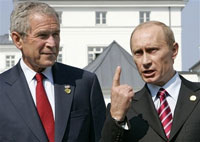G8: Focusing on the issues
The failed attempt by Bush and Blair to sidetrack the main focus of the G8 Summit by making insolent and intrusive references to the policies of the democratically-elected Russian Government constituted a significant blemish on any remaining claim to statesmanship either of these politicians, waning into obscurity, could entertain for their dubious futures. These limp, lame and amateurish tactics to gain protagonism served only to downgrade the Summit to the level of guttersnipe diplomacy before it got under way.

Canada’s Harper (who?) placed himself ominously in the chair of the wannabe Bush boot-licker, with copycat cheap-shots at the Kremlin which only serve to underline his ineptitude on the international stage.
Blair’s last stand
It could have been so glorious. Instead, it was a stagger. The stagger of a tired, worn-out old second-bit actor on his last performance, plied with gin, who instead of proclaiming his three-word line loud and clear, belched and fell off the stage into the orchestra pit. Not even a clatter did he make. More of a dampened and almost imperceptible thud.
By intending to use the G8 Summit to “have a frank conversation about the state of the relationship” between Europe and Russia, Blair overstepped his mark, yet again, as indeed he has done before in the case of Kosovo and Iraq. Neither is Tony Blair the spokesperson of Europe, nor does he have any authority to speak about democracy after the shocking act of butchery he agreed to - and participated in - in Iraq and after granting political asylum to a leading Chechen terrorist.
In the event, the meeting with President Putin was cancelled, relegating Blair to the political insignificance his arrogant attempts at protagonism have afforded him. Canada’s Prime Minister, Stephen Harper, it appears, is vying to take over the position of Chief Whitehouse Bootlicker, with expressed “concerns” as to democracy in Russia and policy references so naive as to be shocking. Indeed, referring to recent well-broadcast murders in the same breath as he criticised the Kremlin, he was paramount to slanderously accusing the Russian Government of involvement in the cases.
Getting down to business
Setting aside the insolence, arrogance and intrusiveness of leaders of countries which would do well to examine their own policies before trying to throw stones at others, the G8 Summit is well under way, firstly with tangible movement on the issue of climate change.
Climate Change
The positions had been marked by the Europeans’ insistence on GEG emission targets and a moratorium on limits proposed by Washington before China and India (main polluters after the USA) made a firm commitment. While no clear figures have been established, the G8 member states agreed today to make “substantial cuts” in emissions, to pledge themselves to a post-Kyoto deal after 2009 (before the agreement expires in 2012) and to “consider” a 50% cut in GEG emissions by 2050.
The agreementwas hailedby Germany’s Chancellor, Angela Merkel, as a success, since it brought the USA into line with a wider UN-sponsored deal.
Investment
On Wednesday, the document “G rowth and responsibility in the world economy” stated that the member states “ support the initiative of G8 Finance Ministers to foster the development of deeper, more liquid local bond markets in emerging economies” to reduce vulnerability in emerging economies.
Africa and Asia
The same document engaged the G8 members to fostering development strategies especially in partnership with NEPAD and APEC, while the OECD, UNCTAD and the World Bank were called upon to provide support for initiatives which sponsor sustainable development and poverty reduction schemes.
Intellectual Property rights
The G8 leaders agreed that the international patent system must be harmonized “to improve the acquisition and protection of patent rights world-wide”. Simultaneously, there was a pledge to crack down on counterfeit goods.
Good governance
The G8 members committed themselves to the fight against corruption at national and international levels, calling upon leaders worldwide to live up to their responsibilities. They pledged themselves to the UN Convention against Corruption (UNCAC) and underlined the need to support the UN Office of Drugs and Crime, the OECD , Interpol and all bodies which support UNCAC.
The principle of dialogue
The Heiligendamm Process was launched at this Summit, whereby a process of increased and ongoing dialogue with emerging countries, such as Brazil, China, India, Mexico and South Africa becomes a permanent facet of policy-making, due to the need “to define a new partnership responding to... world economic
challenges”.
Parallel issues
The Missile Defence Shield was discussed in a meeting between Presidents Putin and Bush, at which the Russian President stated that if the USA is so worried about attack by missiles from Iran and Norh Korea, then Azerbaijan would be a more reasonable location for anti-missile systems than Poland and the Czech Republic. In this case, stated President Putin, Russia would not seek to retarget missiles against Europe. The proposal was described as “interesting” by US National Security Advisor, Stephen Hadley.
Meanwhile other serious international questions continue under discussion, namely the future status of Kosovo.
While there continues to exist a frank and open process of dialogue on serious issues, and not puerile attempts to score cheap political points by casting stones (usually by those with roofs of glass), the G8 Summit will be a useful and productive tool to ease tensions, create bridges and solve questions before they turn into problems. This, at least, is what Moscow intends.
Timothy BANCROFT-HINCHEY
PRAVDA.Ru
Subscribe to Pravda.Ru Telegram channel, Facebook, RSS!


